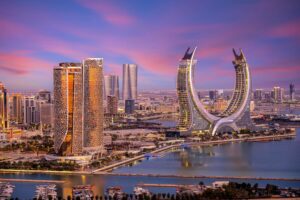The United Arab Emirates (UAE) is becoming an increasingly attractive location for the family offices of high-net-worth (HNW) and ultra-high-net-worth (UHNW) families. In 2022 alone, 5,000 millionaires and billionaires moved to the UAE in what was the single biggest net inflow of millionaires anywhere in the world. That figure is expected to rise to over 6,500 by the end of 2024. By next year, Middle Eastern family offices will have in the region of USD $500 billion in family-office assets under management.
But aside from the more obvious attractions of high quality of life, security and 10-year golden visas, what’s attracting this influx to the country, and what’s in store for the UAE and the family offices relocating here?
What’s happened so far?
Attracting family offices to the UAE, and their high-net-worth individuals (HNWI) owners, has been a targeted national strategy for the Emirates. So, it’s probably little surprise that, as a result of the government’s efforts to spawn wealth creation and broaden investment opportunities in the region, the UAE is now home to around three-quarters of all Middle East-based family offices, with around half of those in Dubai.
In short, the UAE is a major hub for family offices, and the numbers are set to rise even further; investment in hotels, infrastructure, transport and real estate all point to a well-planned strategy for positioning the country as a natural choice for UHNWIs and HNWIs looking to relocate their offices to the region. The UAE anticipates a 30% rise in the number of UHNWIs by 2028. And as the government itself is at pains to point out, “with the Dubai Economic Agenda D33 launched by His Highness Sheikh Mohammed bin Rashid Al Maktoum… the swift expansion of financial wealth in the UAE, which is projected to…reach $1 trillion in 2026… will spur significant growth in the family business sector.”
UAE: the local background
The specific features of the UAE’s financial and regulatory landscape all contribute to making the country a serious player in the family-office sector. Underpinning all of that, however, lies one crucial factor: government vision and stability. This offers family offices the chance to mitigate the uncertainties of a rapidly changing global economy.
Dubai’s government, along with the UAE’s federal government, has for many years presented a clear vision for the diversification of the economy to focus on strategic long-term growth. These investment timeframes align with the long-term, strategic approach typically adopted by family offices in the region, whose primary goal, according to KPMG, is to generate risk-adjusted growth and preserve wealth.
Why is the UAE such an attractive destination for family offices?
As mentioned above, attracting wealth to the country has been part of a well-devised strategic plan, in line with the UAE Centennial 2071 and We Vision 2031 goals. These aim to spur diversification away from hydrocarbon economies and spawn growth in alternative sectors such as financial services, industry and digital technology, wealth management, tourism, aviation, hospitality and real estate. In short, as the government states, it’s a plan to turn the UAE economy into one of the most competitive and dynamic economies in the world: “The plan aims,” as UAE Centennial 2071 makes clear, “at investing in the future generations, by preparing them with the skills and knowledge needed to face rapid changes and to make the UAE, the best country in the world by the next centennial in 2071”.
But what are the specifics that are attracting family offices to the UEA?
Access to emerging markets in MENA: the country offers family offices a strategic platform to leverage the UAE’s bonds across the MENA region. This allows them to gain a competitive advantage in emerging sectors across the GCC, Middle East and North Africa as they look to diversify risk in alternative sectors, markets and jurisdictions.
A mature and vibrant financial ecosystem: The UAE has established a modern financial ecosystem comprising financial institutions, investment and insurance products, and a wealth of professional services. What’s more, the UAE’s commitment to supporting startups and SMEs in the country – the mega-corporations of tomorrow – underpins its strategic long-term growth plans. So much so, in fact, that the UAE’s open-enterprise environment has spawned an SME ecosystem consisting of more than 550,000 firms. Those SMEs deliver around two-thirds of Dubai’s non-oil GDP and account for more than 50% of its workforce.
A favourable tax regime: Although a Value-Added Tax (VAT) was introduced in the UAE in 2018, the country boasts a very competitive taxation regime, with a minimal corporation tax very narrow in its scope– for example, it applies only to specific business activities and locations – no capital gains tax (CGT), zero personal income tax or inheritance tax (IHT) and no net-wealth taxes.
Regulatory flexibility and clarity: Given the need for flexibility in family-office set-up when it comes to structures and investment activities, the UAE’s transparent and supportive regulatory system offers family offices much-needed clarity on regulatory issues. As KPMG’s head of private enterprise for the Lower Gulf notes, “previously many family offices focused heavily on investments and less on having a robust sophisticated operational infrastructure, but this trend has changed. The regulatory framework in the UAE more specifically has been a significant driver in attracting family offices to set up in the country.”
That commitment to a supportive environment for family offices is evident in the UAE’s ongoing and consistent regulatory refinement. For example, the Dubai International Finance Centre (DIFC), one of Dubai’s principal free zones and the largest wealth-management hub in the Middle East, Africa and South Asia (MEASA) region, brought in the Family Arrangements Regulations at the beginning of last year. Among its overall improvements on the Single-Family Office (SFO) Regulations of 2011, DIFC now allows family offices to operate in the zone without having to register with the Dubai Financial Services Authority (DFSA). In addition, it addresses issues such as the arbitration of family-related business disputes. Arbitration is given greater weight in the new regulations, which means that disputes around family trusts, for example, can be dealt with more effectively and confidentially.
Launched in 2022, the DIFC Family Wealth Centre – a new gold-standard hub in advisory wealth-management services like governance and succession planning – is now helping family offices prepare for the anticipated $1 trillion transfer of wealth to the next generation over the course of the coming decade.
Innovation and tech development: the UAE’s commitment to emerging tech like artificial intelligence (AI) offers an attractive home for family offices with the foresight to mitigate risk across investment opportunities in tech industries that will ultimately help form the backbone of the UAE’s diversified post-centennial economy. Globally, around 40% of corporate IT spend is expected to be channelled into AI in the next few years, with an estimated annual investment of $500 billion by 2027.
Stability, security and clarity: The vision of the federal and Dubai governments to attract HNWIs has spawned unprecedented regulatory transformation and attractive risk-mitigation opportunities. The enterprise ecosystems spawned by these changes continue to position Dubai as a frequently irresistible option for relocating family offices.
As more and more family offices flock here, wealth preservation and risk aversion are well catered for in a jurisdiction that is fast becoming the gold standard in wealth management.



